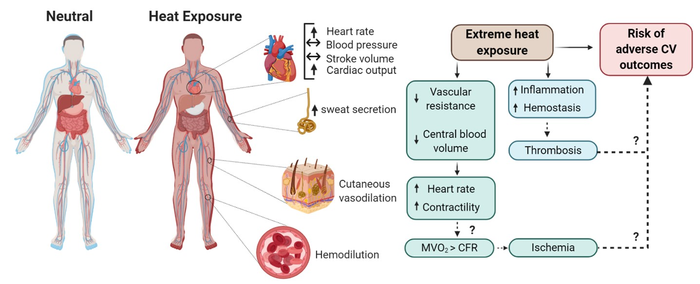Philadelphia, November 18, 2021 – A consequence of global warming is a greater frequency and intensity of extreme heat events. This extreme heat is associated with a greater risk of adverse cardiovascular incidents, especially for adults with pre-existing cardiovascular diseases. Experts writing in the Canadian Journal of Cardiology, published by Elsevier, discuss how extreme heat affects cardiovascular health, why health professionals should care and what recommendations they can make to minimize consequences.

Credit: Canadian Journal of Cardiology
Philadelphia, November 18, 2021 – A consequence of global warming is a greater frequency and intensity of extreme heat events. This extreme heat is associated with a greater risk of adverse cardiovascular incidents, especially for adults with pre-existing cardiovascular diseases. Experts writing in the Canadian Journal of Cardiology, published by Elsevier, discuss how extreme heat affects cardiovascular health, why health professionals should care and what recommendations they can make to minimize consequences.
Extreme heat events, such as heatwaves, are predicted to increase in frequency, severity and duration. Extreme heat poses a risk to human health, increasing the risk of morbidity and mortality. Examples include 70,000 deaths attributed to the European heatwave in 2003, and 55,000 deaths attributed to the 2010 Russian heatwave. Risk factors for heat-related hospitalization include age, chronic illnesses, social isolation, some medications, and lack of access to air conditioning. Among chronic illnesses, cardiovascular diseases are often identified as a risk factor for heat-related hospitalization and death.
“The Intergovernmental Panel on Climate Change (IPCC) recently reported that global temperatures are rising at a greater rate than previously projected, and that the number of extreme heat days will significantly increase across most land regions,” explained senior author Daniel Gagnon, PhD, Montreal Heart Institute, and School of Kinesiology and Exercise Science, University of Montreal, Montreal, Canada. “Although we don’t yet fully understand the reasons, people with cardiovascular disease are at greater risk of hospitalizations and death during extreme heat events.”
The authors conducted a comprehensive review of evidence-based epidemiological studies and noted a consistent association between extreme heat and a greater risk of adverse cardiovascular outcomes. Furthermore, they examined systematic reviews and meta-analyses that considered the effect of extreme heat on adverse cardiovascular outcomes and report that heatwaves significantly increase the risk of death from ischemic heart disease, stroke, and heart failure.
“Although the effects of extreme heat on adverse cardiovascular events have been explained in the context of heatstroke, many events occur without heatstroke, and the mechanisms of these events in the absence of heatstroke remain unclear,” observed Dr. Gagnon. “It is likely that heat exposure increases myocardial oxygen needs.”
The authors consider the possibility that heat exposure puts too much strain on the heart for individuals with heart disease and that heat exposure increases the risk of blood clots forming within the blood vessels that supply the heart.
The authors propose that preventive strategies to minimize cardiovascular risk during extreme heat events should aim to reduce the extent of hyperthermia and dehydration. In Canada, heat-health warnings systems act as a first line of defense by raising awareness of upcoming heat events and recommending strategies to minimize possible heat complications. For example, heat warnings are issued 18-24 hours before a heat event in Ontario and Québec, when ambient temperature will remain above 30 degrees C for a minimum of two days. Public advisories include identifying the signs of heat stress, ensuring people drink adequate amounts of cold fluid or seeking an air-conditioned environment.
Recent research supports electric fan use, skin wetting and immersing the feet in tap water as simple alternatives to air conditioning to stay cool during extreme heat events. “Air conditioning is the most effective strategy that can be recommended since it effectively removes the heat stimulus and minimizes the risk of adverse cardiovascular outcomes,” commented Dr. Gagnon. “However, less than one third of global households own air conditioning.”
The authors note that more research is needed to better understand the reasons why extreme heat is associated with a greater risk of adverse cardiovascular outcomes; the effect of cardiovascular medication on the human body’s physiological responses during heat exposure; the optimal cooling strategies that can be recommended to individuals with heart disease during heatwaves; and safe environmental limits for outdoor exercise in individuals with heart disease.
“Cardiovascular health professionals need to be aware of the negative consequences of extreme heat on cardiovascular health. A better awareness and understanding of the cardiovascular consequences of extreme heat, and of the measures to take to prevent and mitigate adverse events, will help us all assess the risk and optimize the care of patients exposed to an increasingly warm climate,” concluded Dr. Gagnon.
Journal
Canadian Journal of Cardiology
DOI
10.1016/j.cjca.2021.08.008
Method of Research
Systematic review
Subject of Research
People
Article Title
Extreme Heat and Cardiovascular Health: What a Cardiovascular Health Professional Should Know
Article Publication Date
18-Nov-2021




